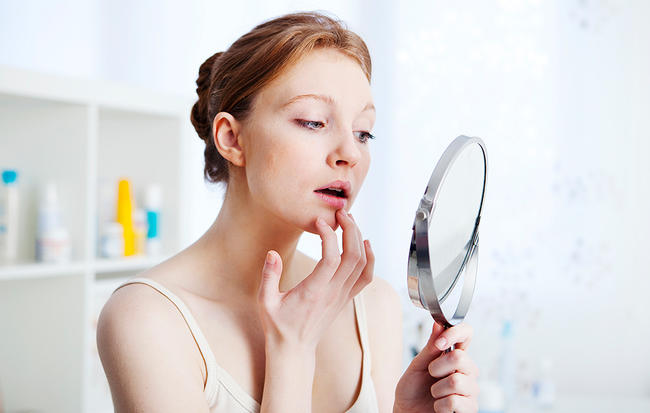Cold sores are one of the only beauty accessories we could do without. And although no one looks forward to those painful, blistery bumps, according to Johns Hopkins Medicine, 50 to 80 percent of U.S. adults have oral herpes… and yes, herpes simplex virus type 1 (HSV-1) is the root cause of every single cold sore.
HSV-1 is passed primarily through oral-to-oral contact, according to the World Health Organization, primarily sores, saliva, or surfaces around the mouth. It can be transmitted from one person to another even when no symptoms are present—though the greatest risk comes from contact with active sores.
The World Health Organization also notes that for most people HSV-1 presents no symptoms, which is why many people don’t realize they have it. However, the virus is also something that never goes away once you do contract it—making cold sores a recurring problem for those who do present symptoms. “It remains asleep and is kept in check by our immune system,” says Sarah Hochman, M.D., a professor of infectious diseases and immunology at NYU Langone Health. “But when our immune system is weakened, which can happen for a number of reasons, the virus can reactivate and cause a cold sore.”
Luckily, not all HSV1 carriers have regular flare-ups, and if you do, there are medications that you can take to treat it ASAP. But to avoid getting to that uncomfortable point, we talked to Hochman about different factors that might inspire cold sores to make a facial cameo.

LACK OF SLEEP
Fatigue can definitely make you easy prey for a cold-sore outbreak. “Sleep is very important for multiple functions in the body, but especially for the immune system,” Hochman says. Without it, the immune system isn’t strong enough to keep cold sores at bay. To reduce your vulnerability, good rest is key.

STRESS
Stress falls under a similar category as fatigue. Not only can it wear down your emotional health, but it can take a toll on your immune system, too.

SICKNESS
According to Hochman, concurrent infections could also bring a dormant HSV1 infection to life. “If someone has an upper respiratory-tract infection, that can be enough to trigger a cold sore,” she says. But it isn’t just pre-existing infections. Hochman says that any kind of major surgery or medical procedure places an added stress to your immune system, which could lead to a cold sore.

YOUR PERIOD
As you have probably figured out by now, anything that disrupts your immune system can trigger a cold-sore outbreak. And nothing disrupts the overall hormonal makeup of your body quite like menstruation does. “There are multiple kinds of changes in hormones around that time and that can have effects on the immune system,” Hochman says. If you notice this pattern, talk to your doctor about medication, because you might be able to nip this trigger in the bud.

MEDICATIONS
Medications that suppress the immune system could also lead to visible HSV1 outbreaks. These could include steroids that target autoimmune diseases as well as medications treating cancers, according to Hochman. Talk to your doctor if you notice cold sores cropping up after you start a new medication. You don’t have to suffer in silence.

SUNLIGHT
If you’re prone to cold sores, consider that another reason to spare your skin and stay out of the sun. While sunlight may be a fantastic way to boost your vitamin D levels, when it hits your face, it can also leave you susceptible to HSV1 outbreaks. No matter the season, wear lip balms and facial moisturizers with plenty of SPF.












